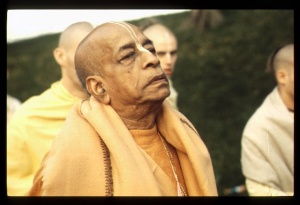SB 10.50.44: Difference between revisions
m (1 revision(s)) |
No edit summary |
||
| Line 1: | Line 1: | ||
{{info | {{info | ||
|speaker= | |speaker=Śukadeva Gosvāmī | ||
|listener=King | |listener=King Parīkṣit | ||
}} | }} | ||
[[Category:Srimad-Bhagavatam - Canto 10 Chapter 50]] | |||
[[Category:Bhagavatam Verses Spoken by Sukadeva Gosvami - Vanisource|105044]] | |||
<div style="float:left">'''[[Srimad-Bhagavatam]] - [[SB 10|Tenth Canto]] - [[SB 10.50: Krsna Establishes the City of Dvaraka|Chapter 50: Kṛṣṇa Establishes the City of Dvārakā]]'''</div> | |||
<div style="float:right">[[File:Go-previous.png|link=SB 10.50.43]] '''[[SB 10.50.43]] - [[SB 10.50.45]]''' [[File:Go-next.png|link=SB 10.50.45]]</div> | |||
{{RandomImage}} | |||
{{SBnotice}} | |||
==== TEXT 44 ==== | ==== TEXT 44 ==== | ||
<div | <div class="verse"> | ||
rurodha mathurām etya | :rurodha mathurām etya | ||
tisṛbhir mleccha-koṭibhiḥ | :tisṛbhir mleccha-koṭibhiḥ | ||
nṛ-loke cāpratidvandvo | :nṛ-loke cāpratidvandvo | ||
vṛṣṇīn śrutvātma-sammitān | :vṛṣṇīn śrutvātma-sammitān | ||
</div> | </div> | ||
| Line 17: | Line 22: | ||
==== SYNONYMS ==== | ==== SYNONYMS ==== | ||
<div | <div class="synonyms"> | ||
''rurodha''—he besieged; ''mathurām''—Mathurā; ''etya''—arriving there; ''tisṛbhiḥ''—times three; ''mleccha''—with barbarians; ''koṭibhiḥ''—ten million; ''nṛ-loke''—among mankind; ''ca''—and; ''apratidvandvaḥ''—having no suitable rival; ''vṛṣṇīn''—the Vṛṣṇis; ''śrutvā''—hearing; ''ātma''—to himself; ''sammitān''—comparable. | |||
</div> | </div> | ||
{{SBcollapse}} | |||
==== TRANSLATION ==== | ==== TRANSLATION ==== | ||
<div | <div class="translation"> | ||
Arriving at Mathurā, this Yavana laid siege to the city with thirty million barbarian soldiers. He had never found a human rival worth fighting, but he had heard that the Vṛṣṇis were his equals. | Arriving at Mathurā, this Yavana laid siege to the city with thirty million barbarian soldiers. He had never found a human rival worth fighting, but he had heard that the Vṛṣṇis were his equals. | ||
</div> | </div> | ||
| Line 31: | Line 36: | ||
==== PURPORT ==== | ==== PURPORT ==== | ||
<div | <div class="purport"> | ||
Śrīla Viśvanātha Cakravartī quotes from the Viṣṇu Purāṇa concerning the history of Kālayavana: "Once, Gārgya was ridiculed by his brother-in-law as a eunuch, and when the Yādavas heard this they laughed heartily. Infuriated by their laughter, Gārgya set out for the south, thinking, 'May I have a son who will bring terror to the Yādavas.' He worshiped Lord Mahādeva, eating powdered iron, and after twelve years obtained his desired benediction. Elated, he returned home. | Śrīla Viśvanātha Cakravartī quotes from the ''Viṣṇu Purāṇa'' concerning the history of Kālayavana: "Once, Gārgya was ridiculed by his brother-in-law as a eunuch, and when the Yādavas heard this they laughed heartily. Infuriated by their laughter, Gārgya set out for the south, thinking, 'May I have a son who will bring terror to the Yādavas.' He worshiped Lord Mahādeva, eating powdered iron, and after twelve years obtained his desired benediction. Elated, he returned home. | ||
"Later, when the childless King of the Yavanas requested a son from him, Gārgya begot in the Yavana's wife a son, Kālayavana. Kālayavana possessed the fury of Lord Śiva in his aspect as Mahākāla. Once, Kālayavana asked Nārada, 'Who are now the strongest kings on earth?' Nārada replied that the Yadus were. Thus sent by Nārada, Kālayavana appeared at Mathurā." | "Later, when the childless King of the Yavanas requested a son from him, Gārgya begot in the Yavana's wife a son, Kālayavana. Kālayavana possessed the fury of Lord Śiva in his aspect as Mahākāla. Once, Kālayavana asked Nārada, 'Who are now the strongest kings on earth?' Nārada replied that the Yadus were. Thus sent by Nārada, Kālayavana appeared at Mathurā." | ||
</div> | </div> | ||
__NOTOC__ | </div> | ||
</div> | |||
<div style="float:right">[[File:Go-previous.png|link=SB 10.50.43]] '''[[SB 10.50.43]] - [[SB 10.50.45]]''' [[File:Go-next.png|link=SB 10.50.45]]</div> | |||
__NOTOC__ | |||
__NOEDITSECTION__ | |||
Revision as of 04:07, 24 May 2021

A.C. Bhaktivedanta Swami Prabhupada
Please note: The synonyms, translation and purport of this verse were composed by disciples of Śrīla Prabhupāda
TEXT 44
- rurodha mathurām etya
- tisṛbhir mleccha-koṭibhiḥ
- nṛ-loke cāpratidvandvo
- vṛṣṇīn śrutvātma-sammitān
SYNONYMS
rurodha—he besieged; mathurām—Mathurā; etya—arriving there; tisṛbhiḥ—times three; mleccha—with barbarians; koṭibhiḥ—ten million; nṛ-loke—among mankind; ca—and; apratidvandvaḥ—having no suitable rival; vṛṣṇīn—the Vṛṣṇis; śrutvā—hearing; ātma—to himself; sammitān—comparable.
Translation and purport composed by disciples of Śrīla Prabhupāda
TRANSLATION
Arriving at Mathurā, this Yavana laid siege to the city with thirty million barbarian soldiers. He had never found a human rival worth fighting, but he had heard that the Vṛṣṇis were his equals.
PURPORT
Śrīla Viśvanātha Cakravartī quotes from the Viṣṇu Purāṇa concerning the history of Kālayavana: "Once, Gārgya was ridiculed by his brother-in-law as a eunuch, and when the Yādavas heard this they laughed heartily. Infuriated by their laughter, Gārgya set out for the south, thinking, 'May I have a son who will bring terror to the Yādavas.' He worshiped Lord Mahādeva, eating powdered iron, and after twelve years obtained his desired benediction. Elated, he returned home.
"Later, when the childless King of the Yavanas requested a son from him, Gārgya begot in the Yavana's wife a son, Kālayavana. Kālayavana possessed the fury of Lord Śiva in his aspect as Mahākāla. Once, Kālayavana asked Nārada, 'Who are now the strongest kings on earth?' Nārada replied that the Yadus were. Thus sent by Nārada, Kālayavana appeared at Mathurā."